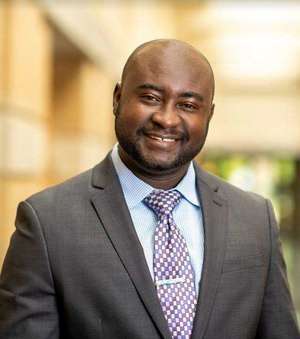
Ellis Adjei Adams immediately breaks into a smile when asked about his research on water policy. “I love talking about water,” Adams says energetically and emphatically. “I am so lucky to study an issue I’ve experienced personally. When I speak about water access challenges in Africa, I’m speaking as an academic but also as someone who knows what it’s like to have your mother tell you, ‘You cannot go to school today because we don’t have enough water at home. School is open, but we have no water for breakfast or tea or to prepare your lunch.’”
Growing up in Ghana, Adams also saw his neighbors dying from diarrhea caused by contaminated water—deaths he’d later learn were highly preventable with safe water. His intellectual curiosity about these personal experiences led Adams to study natural resources management at Kwame Nkrumah University of Science and Technology in Ghana.
“The topic of water kept coming back to me, both its quality and quantity,” says Adams, who joined the Keough School of Global Affairs in August 2020 as assistant professor of geography and environmental policy. “I started to question why some people have access to water while others do not, why certain water policies fail or work, and how water policies can be designed to work for the poor and most vulnerable.”
Adams earned a PhD in geography, environment, and spatial sciences from Michigan State University, launching an academic career dedicated to the social, political, institutional, and governance dimensions of environmental and natural resources, especially water. His water research, which includes active projects in Ghana, Malawi, Uganda, Brazil, and the United States, focuses on urban water insecurity; water policy and governance; and gender, water, and sustainable development.
“Water has come to be tied so strongly to money and power and control,” Adams says. In developing countries, it also is inextricably connected with the daily lives of women, who in many developing countries are charged with the responsibility of acquiring water for their families.
“The gender dynamics around water have a long history,” says Adams. “Women worry about lack of water not just because of the lack of water itself, but because the ability to provide water for their household is what defines them as wives. It’s driven by masculine expectations—a married man does not fetch water. Because of these deeply embedded social norms, we have to think of alternative ways to ease the pressure on women before we think about changing the norms. The men who do attempt to challenge longstanding social norms are often scorned.”
Women walking long distances to acquire water often face physical dangers such as injury and sexual assault, and additional dangers have surfaced amid the COVID-19 pandemic. It’s difficult to practice social distancing while standing in long lines at water sources, which makes women more susceptible to contracting COVID-19. And of course, when water supply is limited, critical habits such as handwashing become nearly impossible. Adams detailed these and other challenges in a blog post on the Keough School’s Dignity & Development blog in honor of World Water Day.
Adams was drawn to the Keough School because of its mission of promoting integral human development, a normative approach to policy-relevant scholarship that prioritizes human dignity.
“My research is not just for research’s sake,” Adams says. “I’m always thinking about how I can impact and improve lives. If you provide people with water, you have such a multiplicative impact—you have less gender-based violence, you address food insecurity, you tackle poverty, and you empower women to take care of other aspects of their lives that water insecurity takes away.”
Though he’s been at the Keough School less than a year, Adams has already found many collaborators at Notre Dame. Working with faculty and staff at the Keough School’s Pulte Institute for Global Development, he has been awarded a research grant to study connections between water as a human right and mining around the world. Funded by BHP mining company, the project is aiming to bring a rights-based approach to water security and management in the context of mining and its impact on marginalized communities. He also is part of the research group H2O@ND, a newly formed umbrella group of scholars from different disciplines and across the Notre Dame campus studying different aspects of water, and a faculty fellow of the Keough School’s Kellogg Institute for International Studies. Adams is actively involved in Notre Dame’s Environmental Change Initiative (ECI), and is a co-principal investigator on a pending National Science Foundation grant. If funded, he will work with ECI and other Notre Dame collaborators to develop new frameworks and tools for addressing environmental and socio-economic challenges in the Midwestern Rust Belt region.
Adams also has actively engaged with undergraduate and graduate students during his first year on campus. This semester he is teaching the undergraduate course “Global Environmental Issues & Policy,” which addresses issues including fracking, deforestation, droughts, and connections between water access and racism. He also teaches the master of global affairs courses “Climate Change & Environmental Policy” and “Global Water Policy & Governance.”
“It’s fascinating how much we can talk about water each week,” Adams says. “I enjoy the drive that Notre Dame students have—they are ambitious and don’t shy away from that ambition, and they let you know when they have questions.”
Today, World Water Day, is an opportune time for each person to think about how they can be part of the solution to water insecurity around the globe. Adams offers two suggestions for moving forward: Donating to nongovernmental organizations such Water Aid, Water for People, and Catholic Relief Services can be a helpful first step, but there also are everyday actions each person can undertake.
“Be circumspect about how much water you use, even something simple like shortening your shower,” Adams says. “Global water is one common resource, and to protect it in one part of the world is to participate in the broader scheme of conserving it for people in another part of the world.”